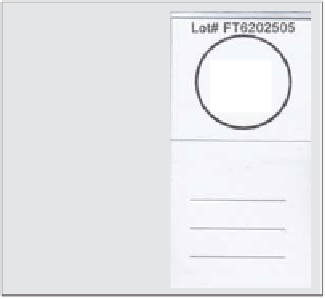Biology Reference
In-Depth Information
Figure 3.8
FTA
cards can be used to store both blood and buccal cells. The cellular material lyses
on contact with the card. The DNA binds to the card and is stable for years at room temperature
FTA
cards can be used to store both buccal and blood samples (Figure 3.8). The
FTA
card is a cellulose-based paper which is impregnated with chemicals that cause
cellular material to break open; the DNA is released and binds to the card. The chem-
icals on the card also inhibit any bacterial or fungal growth and DNA can be stably
stored on FTA
cards for years at room temperature as long as the card remains dry.
Storage of biological material
Biological material collected for DNA analysis should be stored in conditions that
will slow the rate of DNA degradation, in particular low temperatures and low
humidity. A cool and dry environment limits the action of bacteria and fungi that find
biological material a rich source of food and can rapidly degrade biological material.
The exact conditions depend on the nature of the samples and the environment in
which the samples are to be stored. Buccal swabs and swabs used to collect material at
a crime scene can be stored under refrigeration for short periods and are either frozen
directly or dried and then stored at
−
20
◦
C for longer term storage. Blood samples
will normally be stored at between
80
◦
C. Buccal and blood samples
collected using FTA
cards can be stored for years at room temperature. Some items
of evidence, like clothing, can be stored in a cool dry room; in temperate regions
of the world DNA has been recovered from material stored at room temperature
for several years [59]. When samples are not frozen, for example clothing, they are
stored in acid-free paper rather than plastic bags, to minimize the build up of any
moisture. Once the DNA has been extracted from a sample, the DNA can be stored
shorttermat4
◦
C but should be stored at
20
◦
Cand
−
−
20
◦
Cto
80
◦
C for long-term storage.
−
−
References
1. Kloosterman, A.D. and Kersbergen, P. (2003) Efficacy and limits of genotyping low copy
number DNA samples by multiplex PCR of STR loci.
Progress in Forensic Genetics
,
9
,
795 - 798.







